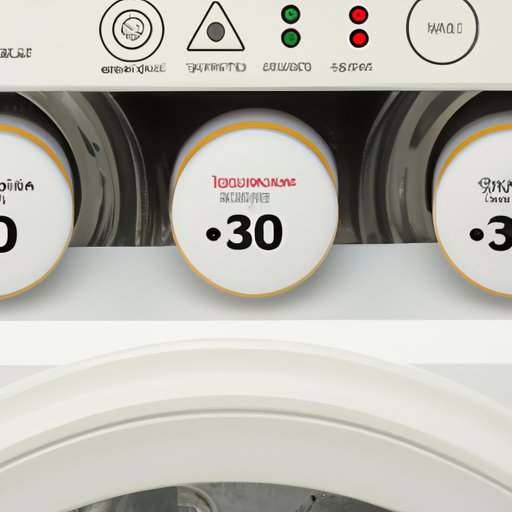Introduction
When it comes to laundry, washing machines are an essential part of modern life. But how long does a washer take to do its job? In this article, we’ll explore the average washing machine cycle time, the different types of washers, and the various factors that affect washer cycle times. We’ll also provide tips for reducing your washing machine cycle time and maximizing efficiency.
An In-Depth Look at the Average Washing Machine Cycle Time
The average washing machine cycle time can vary greatly depending on several factors. Generally speaking, the average washer cycle time is between 30 minutes and 1 hour. However, some cycles may take longer or shorter depending on the model and brand of washer, as well as the type of wash cycle selected.
Factors Affecting Washer Cycle Times
There are several factors that can affect the length of a washer cycle. These include the soil level, spin speed, temperature settings, water pressure, and the size of the load. Each of these factors will affect the overall cycle time, so it’s important to consider them when selecting a washer cycle.

Exploring the Different Types of Washers and Their Cycle Times
When it comes to washers, there are three main types: top-loading, front-loading, and high-efficiency. Each type of washer has its own unique cycle time, so it’s important to understand the differences between them.
Top-Loading Washers
Top-loading washers are typically the most affordable option. They tend to have shorter cycle times than other types of washers, with the average cycle lasting between 25 and 45 minutes. However, they may require more energy to operate since they use more water.
Front-Loading Washers
Front-loading washers are more expensive than top-loading washers, but they use less water and energy, making them more efficient. The average cycle time for a front-loading washer is between 40 and 60 minutes, although some models may take longer or shorter depending on the cycle selected.
High-Efficiency Washers
High-efficiency washers are the most efficient type of washer available. They use less water and energy than traditional washers and generally have longer cycle times. The average cycle time for a high-efficiency washer is between 50 and 70 minutes.
How to Reduce Your Washing Machine Cycle Time
If you want to reduce your washing machine cycle time, there are several things you can do. First, adjust the water temperature according to the type of fabric and the amount of dirt. Second, use less detergent than usual, as too much detergent can lead to longer cycle times. Third, select the appropriate water level to ensure that the washer isn’t overfilled. Fourth, clean the lint filter regularly to prevent clogs. Finally, choose the right size load for the washer—too small of a load will require more time to wash, while too large of a load can cause the washer to become overloaded.

A Guide to Understanding the Different Factors Affecting Washer Cycle Times
When it comes to washer cycle times, there are several factors that can affect the length of the cycle. The soil level is one of the most important factors, as dirtier clothes require more time to wash. The spin speed of the washer also plays a role in determining the cycle time—the higher the spin speed, the faster the cycle time. Temperature settings are another factor—hotter water takes longer to heat up and rinse off. Lastly, water pressure can affect the cycle time—low water pressure will result in a longer cycle time.
What is the Normal Length of a Washing Machine Cycle?
The normal length of a washing machine cycle varies by model and brand. Generally speaking, the average washer cycle time is between 30 minutes and 1 hour. However, some cycles may take longer or shorter depending on the type of wash cycle selected.
The Pros and Cons of Longer and Shorter Washer Cycles
Longer washer cycles have their advantages and disadvantages. On the plus side, longer cycles provide a deeper clean, which can help remove tougher stains and odors. On the downside, they use more energy and water, which can add up over time. Shorter washer cycles also have their benefits and drawbacks. While they save energy and water, they don’t always provide a thorough cleaning.

Tips for Maximizing Efficiency on Your Washing Machine Cycle Time
To maximize efficiency on your washing machine cycle time, there are a few steps you can take. First, calculate the capacity of your washer—this will help you determine the best size load for each cycle. Second, pre-treat any stains before placing items in the washer. Third, use cold water whenever possible to save energy. Finally, run only full loads to get the most out of each cycle.
Conclusion
Washing machines are an indispensable part of modern life. But how long does a washer take? As we’ve seen, the answer to this question depends on many factors, including the type of washer, the type of wash cycle selected, and the various factors that can affect washer cycle times. By understanding these factors and taking steps to reduce your washing machine cycle time, you can maximize efficiency and get the most out of your washer.


